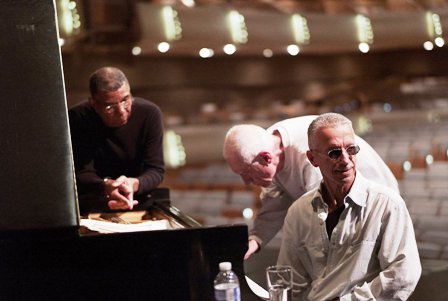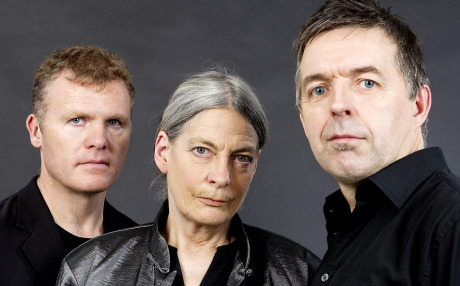
The German label ECM founded in 1969 by Manfred Eicher, who turned 70 this year, drives the independent jazz record release scene in Europe like no other, its arc of influences extending far beyond particularly into the US and Japan. Here’s a look back over a banner year
Keith Jarrett’s Hymns Spheres was released complete for the first time as a double CD set in January, the only version on CD (as opposed to the harder-to-find vinyl) that does exist lopped off five of the Spheres movements and the pair of Hymns.
Stephan Micus’ Panagia by contrast featured settings of Byzantine Greek prayers on an album that amounted to Micus’ 20th album for the label, an astonishing tally for the Mallorca-based German composer who defies categorisation. New Age-y, contemplative, and thought provoking, it was an hour of music with its alternating sung poems and instrumentals you need to experience as a single entity, preferably in one hearing.
A different sense of wonder and mysticism with a definite myth-making agenda of its own, tenor-of-our-times Chris Potter on his ECM debut The Sirens came up with something very special indeed, one of the label’s very best records of 2013. There was a tenderness at play that Potter is expert at here, maybe the best interpreter of a ballad since, in a different idiom, Stan Getz. Larry Grenadier on bass sounds different here than the way he plays with Brad Mehldau, he’s actually sounding more like he does with Fly.
Stefano Battaglia Trio’s Songways saw Milan-born Battaglia joined once again by Sassari-born double bassist Salvatore Maiore, and drummer Roberto Dani, the youngest member of the trio who has performed with Norma Winstone among others. Battaglia on this his fifth album as a leader for the label managed to merge a deep contemplative playing style with a sparkling joyous side to his playing, say on a track such as ‘Babel Hymn’ where to place Battaglia it’s like the coming together of Keith Jarrett and Danilo Pérez’s combined playing styles. An album of songs, chants, and dances with Battaglia attempting to bridge what he calls “archaic modal pre-tonal chant and dances, pure tonal songs and hymns and abstract texture.”
One of the most significant and well received of ECM’s output this year in terms of end of year lists marked the 75th birthday of Charles Lloyd. An at-times harrowingly-intense duo album Charles Lloyd and Jason Moran’s Hagar’s Song united a master of jazz from the 1960s with a pianist pushing the music forward today and whose Fats Waller project in 2014 promises to reassess an important strand in historic jazz with the eye of a forward thinking 21st century innovator.
Tomasz Stańko’s latest album for ECM released this year was also his most ambitious with a new band and his first double album. Recorded not long after a brief tour in Europe the theme of the album ties in with the poetry of the great Wisława Szymborska, hence its title: Wisława. Stańko performed with the Nobel laureate late in her life, and a number of the album’s compositions are inspired directly by her work. And they are sublime, particularly the title track ballad and ‘Mikrokosmos’. Stańko’s best album since Leosia and a potent reminder should one be needed of the artistry of the man.
Noir, melody and mystery were elements in the debut album of Enrico Rava pianist Giovanni Guidi whose City of Broken Dreams had its fair share of admirers. Guidi, a child of the 1980s, little known until now beyond his connection to Enrico Rava as the trumpeter’s pianist, this Bley-esque debut as a leader for ECM is really very different to what you’ll hear on a Rava record. Lovely music throughout from a highly promising new leader, and it’s beautifully played and cultured although lacking a certain bite at times.
Iva Bittová’s self-titled album was one of the surprises of the year, the Czech vocalist and violinist hovering at the pared-down end of improv with occasional bird-like forays and the incantatory power of a prophetess at other times. Surprisingly tuneful in parts, although mysteriously so the approach is defiantly unorthodox and more structured than it seems at first. Bittová manages to sound as if she’s from a desperately remote place, the instrument of a song emerging from the earth itself, yet the improvisations are never alienating.

Iain Ballamy, June Tabor, and Huw Warren
Months after release the German critics garlanded the debut of June Tabor, Iain Ballamy and Huw Warren’s Quercus with one of their top prizes and an international fillip for the British jazz scene. Straddling folk and, by association and intent, jazz, texts of the songs draw on disparate sources including Robert Burns, AE Housman and Shakespeare and highlights include the lovely ‘Who Wants the Evening Rose’ where the honesty of Tabor’s voice momentarily recalling the late Kirsty MacColl, is truest. Ballamy here, oak-sturdy as the genus the band itself takes its name from, intertwines his improvisations with Warren’s superbly empathetic accompaniment so appropriately.
Not everything succeeded quite so conclusively this year for the label but apocalyptic saxophone certainly carried the day on Nicolas Masson/Roberto Pianca/Emanuele Maniscalco’s Third Reel an album that required some patience nonetheless.
But not so Ketil Bjørnstad’s La notte the Norwegian pianist choosing film as a subject and Antonioni’s 1961 drama La Notte a direct inspiration with a cover image from the film making overt the link, this live sextet album recorded in Norway just under three years before, is less introverted than Bjørnstad’s sublime trio album Remembrance with both saxophonist Andy Sheppard and cellist Anja Lechner bringing great personality to the bittersweet themes.
The still much too under-celebrated Julia Hülsmann produced some of her best work ever released on record this year, with In Full View, the pianist/composer’s latest album a quartet affair, Hülsmann joined by British trumpeter/flugel player Tom Arthurs whose ‘Forgotten Poetry’ was a firm highlight of an album that as a quartet extends the ambition of Hülsmann’s writing that bit further, and shows the acute sensitivity of Arthurs on melancholic ballads and mood pieces.
Craig Taborn’s best work this year may have appeared on the wondrous Dave Holland album Prism or on The Sirens mentioned earlier but his trio album Chants raised the pianist’s profile even more this year. Taborn’s atonal sense is very strong as is his tenderness and controlled calm on the long ‘All True Night / Future Perfect’ the centrepiece of a rewardingly involving album.
Lucian Ban/Mat Maneri’s Transylvanian Concert was certainly one of the more unusual albums of the year, a piano-viola duo album that channelled serialism, an abstract often achingly-plangent wash of bittersweet registers, and naturally conceived improvisations. The improvisational spirit, beginning at the crossroads of the free jazz revolution and Nicolas Slonimsky’s theoretical influence on John Coltrane by the early-1960s, are at the album’s inspired core.
On Susanne Abbuehl’s The Gift, one of ECM’s most innovative vocals albums of the year, with music composed to interpret the poetry of Sara Teasdale, Emily Brontë, Wallace Stevens, and above all Emily Dickinson, Swiss singer Abbuehl has retreated from the world to paradoxically embrace it on an album that has a beautiful power of its own making, with the shaping of mood, the channelling of the source texts and the knowing, at times Norma Winstone-like quality of Abbuehl’s voice and compositions so very striking.
ECM’s most famous piano trio of Keith Jarrett, Gary Peacock, and Jack DeJohnette returned with Somewhere one of the label’s most anticipated records which didn’t disappoint, the Standards trio’s twentieth album together, and their first since the live album Up For It was released a decade before. The presence of two songs from West Side Story was one significant thread, title track ‘Somewhere’ leading to Jarrett’s rococo response ‘Everywhere’, as well as ‘Tonight’. And there was also a strong Miles Davis connection, the trio’s guardian angel, in ‘Solar’ the standard seamlessly added to Jarrett’s intense ‘Deep Space’.
A father figure of European prog-jazz Terje Rypdal also returned in 2013 with Melodic Warrior, a nine-part suite for electric guitar and voices with the Bruckner orchestra Linz conducted by Dennis Russell Davies in tow. And there were some thrilling moments under its bonnet: the Hank Marvin-esque bravura Rypdal solo ‘My Music Reaches to the Sky’ with the coiled power of the orchestra in accompaniment, and the Hilliard Ensemble as inscrutable as ever here singing Native American texts.
There was a huge duo treat in store in the shape of Gary Peacock and Marilyn Crispell’s Azure Crispell’s tune ‘Waltz After David M’ just beautifully conceived within a post-bebop piano timeline that journeys back to Bill Evans but also reveals a significant compositional voice at play. The anti-grammar of the tunes on Azure, the role of Peacock as an equal soloist, and the radical conception of musical freedom they share make the experience of listening to him very rewarding.
June saw the Swallow Quintet’s playful Into the Woodwork Carla Bley’s stealthily-alert organ part on opener ‘Sad Old Candle’ and a quietly brooding Chris Cheek on tenor saxophone preparing the way for an often quite unusual album. Cheek almost stole the show entirely on ‘Small Comfort’ with a Getzian solo of real surprise emerging from a quality arrangement; and Carla Bley has some offbeat moments to raise a cheer near the end on ‘Still There’ and she’s witty and quirky throughout. Swallow’s funky bass figure on ‘Exit Stage Left’ is also a treat.
More austere was the Christian Wallumrød Ensemble album Outstairs the six-piece Ensemble adding to four earlier albums already in the ECM catalogue albeit with considerable line-up flux. The picture the ensemble paints, the trumpet of Eivind Lønning and tenor saxophone of Espen Reinertsen certainly more reticent in the overall sound, is fundamentally distant even deliberately alienating: the looking-within almost deriving from minimalism. Per Oddvar Johansen’s drum patterns in places add a sense of the medieval to the music that tantalises considerably throughout the album, but in the end it’s all rather severe music, a narrative that never quite resolves itself and keeps the listener at arm’s length.
With an output as large as ECM’s I didn’t manage to hear Kayhan Kalhor and Erdal Erzincan’s Kula Kulluk Yakisir Mi, one of the year’s more obscure releases and hardly any of the New Series releases at all although Eleni Karaindrou’s Concert in Athens, which was on New Series, but belonged more in the main catalogue, was one of my favourite releases on the label this year. You’d need to be made of flint not to be moved by ‘Requiem for Willie Loman.’
Stefano Bollani / Hamilton De Holanda’s O Que Será , a live album recorded in Antwerp, was one of ECM’s warmest albums, the Italian pianist and Brazilian mandolim player in a setting that compares to some of the live collaborations Chris Thile and Brad Mehldau have made together.

Yeahwon Shin
As for new artists, and the label showcased quite a few this year, Yeahwon Shin was one of ECM’s discoveries of the year with Lua ya, the debut of South Korean singer Yeahwon Shin on ECM joined here by former Terence Blanchard pianist Aaron Parks and accordionist Rob Curto. “Dedicated to mothers and children everywhere”, Lua ya is full of pretty, naturalistic melodies and quiet diversions, mood pieces quite discernibly all, some written by Shin with Parks and one with all three performers sharing the writing credits. There may only be tiny intimations of a jazz method, mostly provided by little hints and nudges from Parks, but it’s mostly beyond-genre late night listening for any age.
Marc Sinan and the Dresdner Sinfoniker's Hasretim: Journey to Anatolia passed me by alas but Carla Bley, Andy Sheppard, and Steve Swallow’s Trios didn’t, one of the label’s most intimate releases and Bley’s best album since Fancy Chamber Music: a certain palpable grandeur even in the reduced scale.
Ralph Towner, Wolfgang Muthspiel, and Slava Grigoryan’s Travel Guide was catnip for guitar enthusiasts with ECM veteran Towner joined for the first time on a recording of the label’s by Austria-born Muthspiel and the Melbourne-raised Kazakh Grigoryan. An album that while gentle at times has a subtle power all of its own and some sumptuous melodies intricately arranged off-set only by brittle textures and that faraway atmosphere Towner has made his own.
John Abercrombie’s 39 Steps was a gem with a lilt and a bittersweet quality that draws you in but never too close. An album Manfred Eicher was keen to release quickly, it was a bit different to last year’s standards outing Within a Song, which featured Joe Lovano, this time Lovano is absent and Philly-born pianist Marc Copland joined the 68-year-old New York state-born guitarist, with bassist Drew Gress and drummer Joey Baron in empathetic tow. A master of jazz guitar still in his prime.
One of the selections on the Jazz on 3 year-end round up just before Christmas on BBC Radio 3 Ralph Alessi’s Baida rewarded the promise the trumpeter had long displayed with the 50-year-old sounding as if it’s his moment, a chance for long germinated musical ideas to be put across to a big potential audience on record. Clear lines, rather than intricate circuitry are what counted here on a very challenging but rewarding quartet record nonetheless.
The latest in a long line of solo piano albums on the label and up there with the best Aaron Parks’ Arborescence featured a pianist whose sound is as softly precise as a Tord Gustavsen’s, as devastatingly rhapsodic as a Brad Mehldau’s; as complex and opaque as a Jason Moran's; and as detailed as a Vijay Iyer’s.
Tim Berne’s Snakeoil ratcheted up the intensity levels once more with Shadow Man picking up where Snakeoil left off, the routine after the four-minute 19-seconds mark on ‘OC/DC’ when Berne and Noriega rage jaggedly against the twin forces of piano and vibes to intuitive effect is one of the album’s most thrilling moments.
I was a bit disappointed by Maria Pia De Vito, François Couturier, Anja Lechner, and Michele Rabbia Il Pergolese, a different, much more formal Maria Pia De Vito to the same singer you’ll find on Colin Towns records. Maybe it was because it was much more of a classical album than a jazz release (and I missed hearing Huw Warren with the singer), it’s most obviously of appeal to Pergolese aficionados, and De Vito completists.
But there was no disappointment as the year ended as it began with a Keith Jarrett reissue, this time Concerts: Bregenz/München with some sublime moments on a 3-CD set. Jarrett playing guitar on No End released for the first time was less convincing yet ultimately Jarrett dominated 2013 at ECM but debuts by new artists (particularly Parks) showed newer generations making their mark to considerable effect. Stephen Graham
Keith Jarrett, pictured top, with Jack DeJohnette his hands clasped on the piano, and Gary Peacock looking down. Photo: ECM